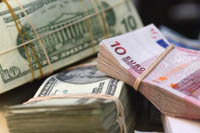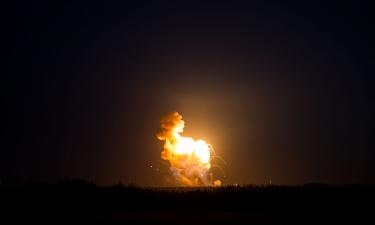Dollar may hit record high against euro soon
The euro sank to a record 18-month low against the ruble on Monday. The European currency fetched 33.33 rubles. It is the first time the euro hit such a low since late summer of 2003. It is worthy of note that the dollar slid down too, it lost more than 3 kopeks. Experts point out that a downward trend in both currencies has been noticeable for two weeks in a row. Politkom.ru has already drawn attention to the trend, which can only be explained by the Central Bank policy aimed at strengthening the ruble in order to avoid rise in inflation. Meanwhile, international experts predict a global collapse of the euro by late spring. The dollar may hit a record high of $1.15 per euro, which equals about 30 rubles per euro. Thus, the year 2002 might as well come back.

David Mosina, senior foreign exchange expert at Lehman Brothers, says that the euro is unlikely to head higher in the near future. “The euro has lost momentum and therefore any opportunity for the euro comeback should be used for selling. The dollar may end up standing at $1.15 per euro in the next three months,” says Mosina. According to him, traders should massively sell the euro. Given the recent upward trend in all major U.S. market indexes, investors are paying more attention to U.S. assets. Meanwhile, oil prices soared again last week – a factor that does not contribute to economic growth in the EU.
This week foreign currency speculators are going to lay special emphasis on results of European Central Bank’s meeting slated for March 2. The meeting is expected to raise the base rate again by 0.25% to 2.5%. “Despite the fact that the latest forecasts for the U.S. economy look good, they can only give some short-term boost to the dollar. The forecasts are rather a factor to keep the dollar from sliding even deeper, they can not stimulate its rise,” says Elena Khrupova, analyst at the investment company Broker Credit Service. However, many experts suggest that dollar will maintain its position due to the impact of higher oil prices and sluggish economic growth in the euro area.
Contrary to last year’s situation on the Russian foreign exchange market, which followed hot on the heels of the international foreign exchange market, Russian Central Bank appears to have changed its position with regard to the national currency in 2006. According to estimates by the Economic Development and Trade Ministry, inflation should reach 3.9% in the first two months of the year, almost a half of the official inflation forecast (8.5%) for 2006. During a recent meeting with the Cabinet, President Putin has asked the government to pay special attention to inflation as a main hindrance to economic development. The Central Bank acted as though it was ready and willing to please the president. The exchange rate of both the euro and the greenback began to simultaneously slip down in a matter of days. The trend has not been in place for last five years at the very least. The ruble gets weaker as the two currencies strengthen, and vice versa. Even without further debating over the bureaucrats’ interpretation of the “real effective foreign exchange rate of the ruble”, it is still unclear how the government intends to boost Russia’s economic growth while making domestic producers less competitive?
Meanwhile, the steps taken by the Central Bank may result in quite dire consequences because the EU, Russia’s most close neighbor and principal economic partner, is currently losing the competition battle with Russian companies. The only reason lies in the strength of the euro. A weaker European currency should make the EU goods more attractive to the Russian consumer. Should the experts’ forecasts come true, the euro will devalue by more than 10% and hit a nearly 30-ruble level. Given the anticipated currency rates for the fall of 2006, the euro’s devaluation against the dollar will total 20%, and therefore the EU goods will be much cheaper than those made locally.
The development will undoubtedly have a negative impact on Russian companies e.g. the automobile industry. Those who have relied on a strong euro until recently will be affected too.
Politcom
Translated by Guerman Grachev
Subscribe to Pravda.Ru Telegram channel, Facebook, RSS!





